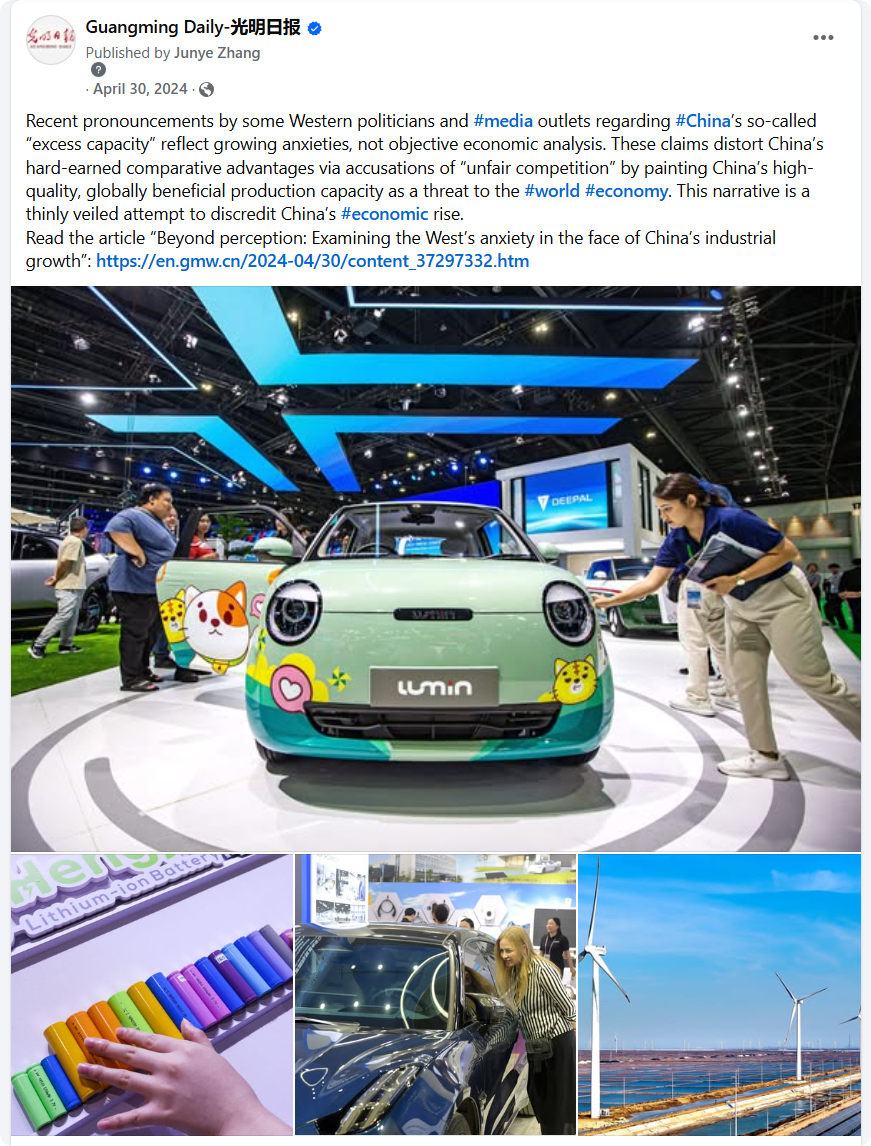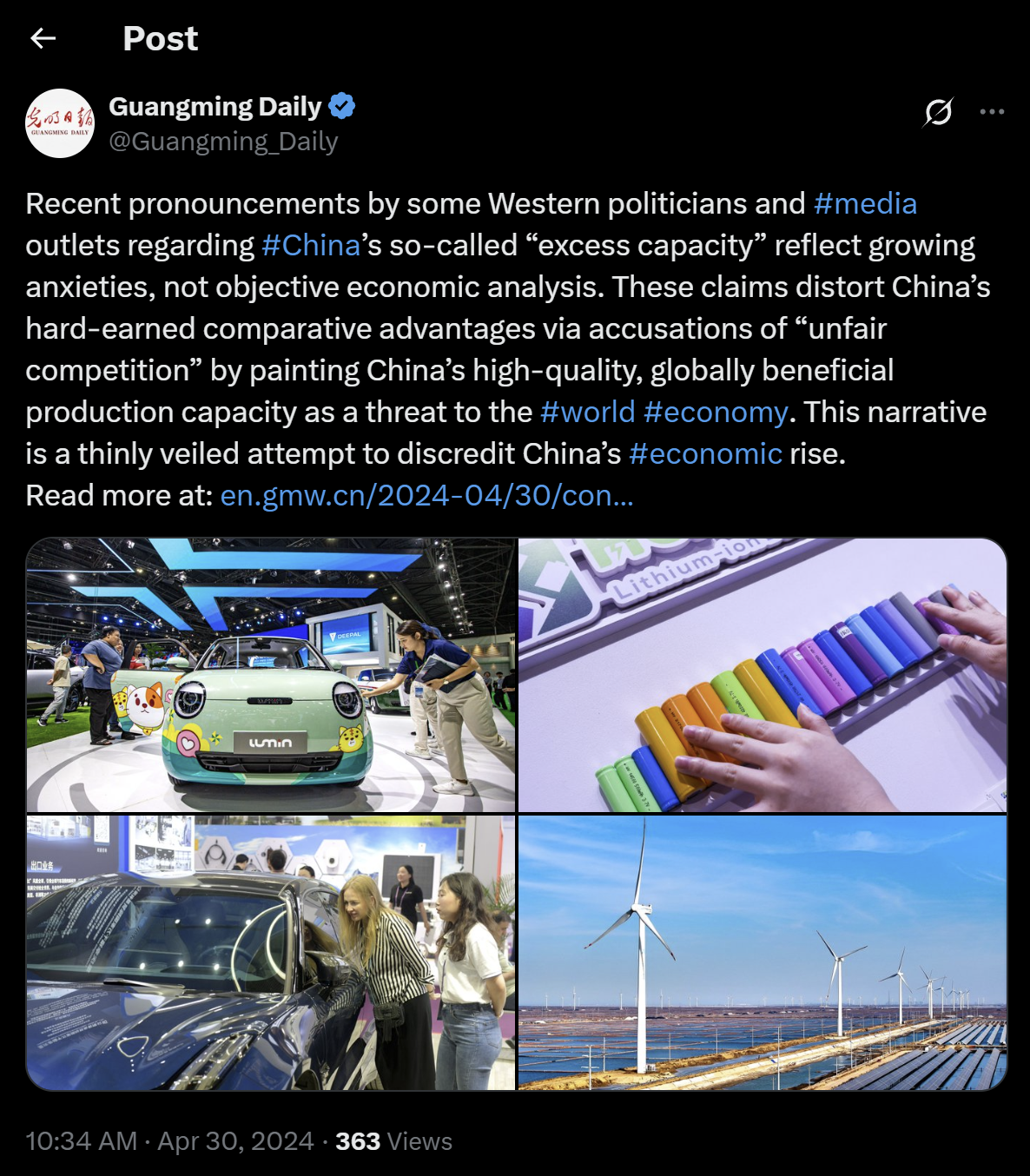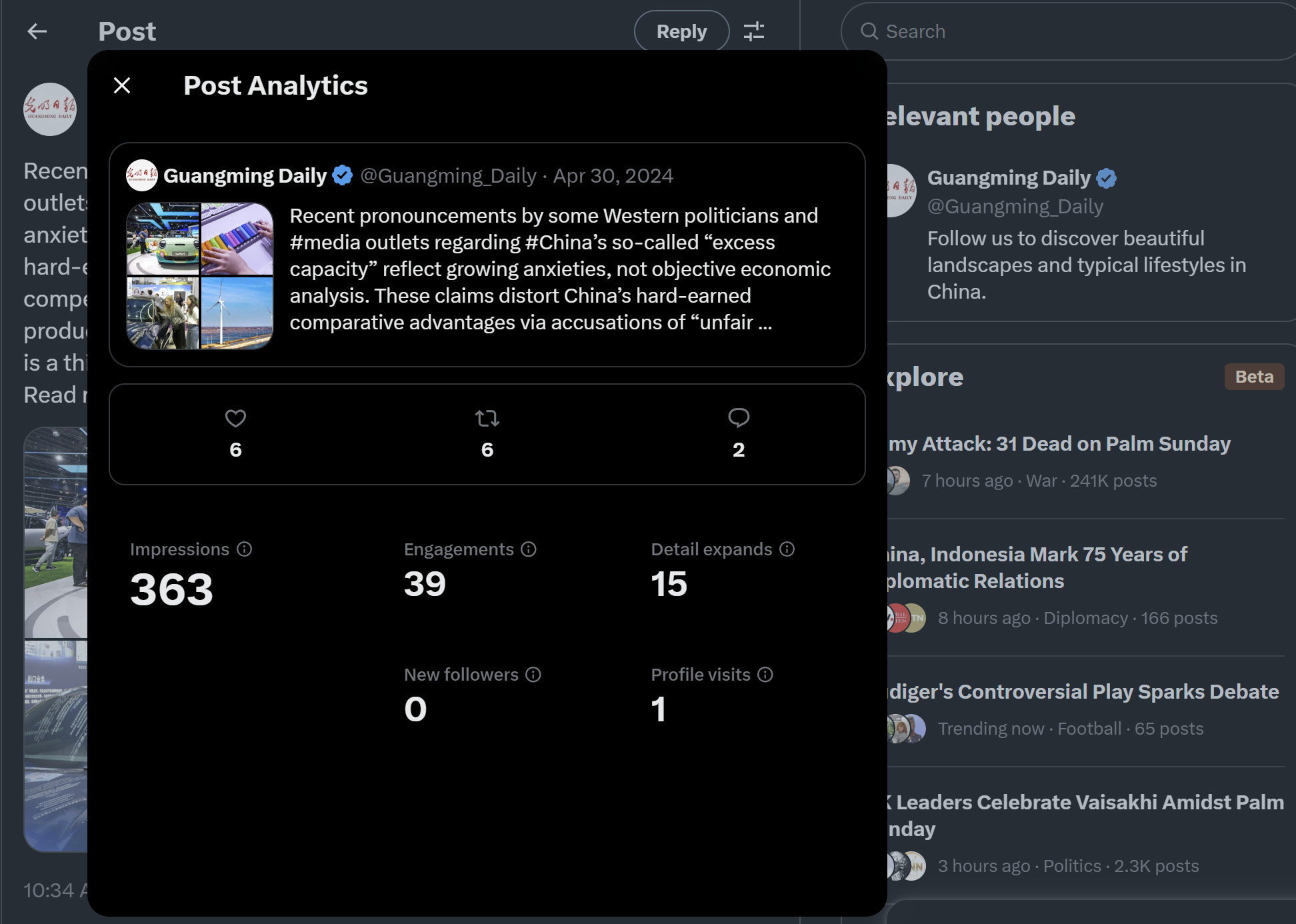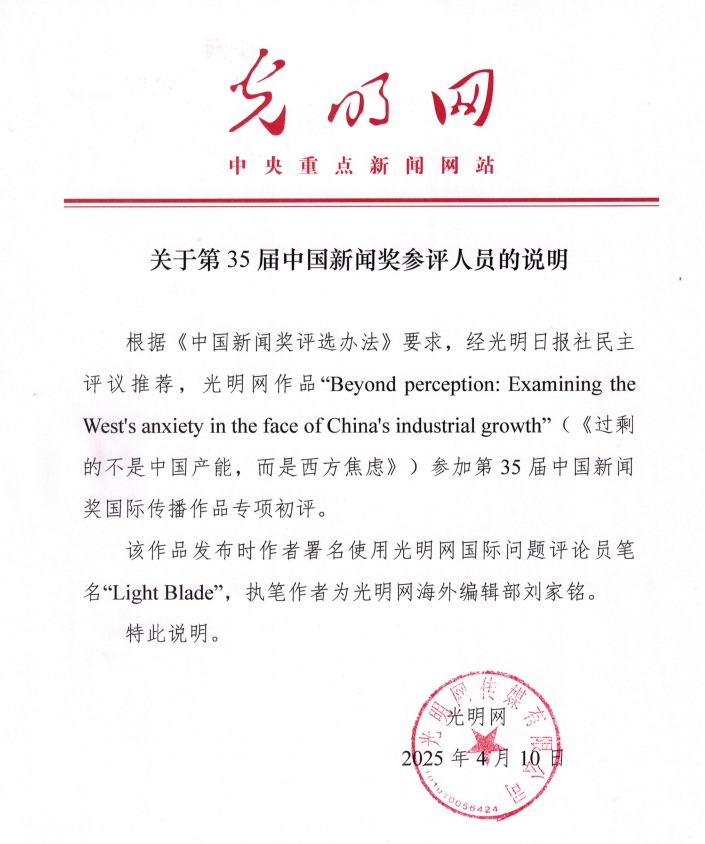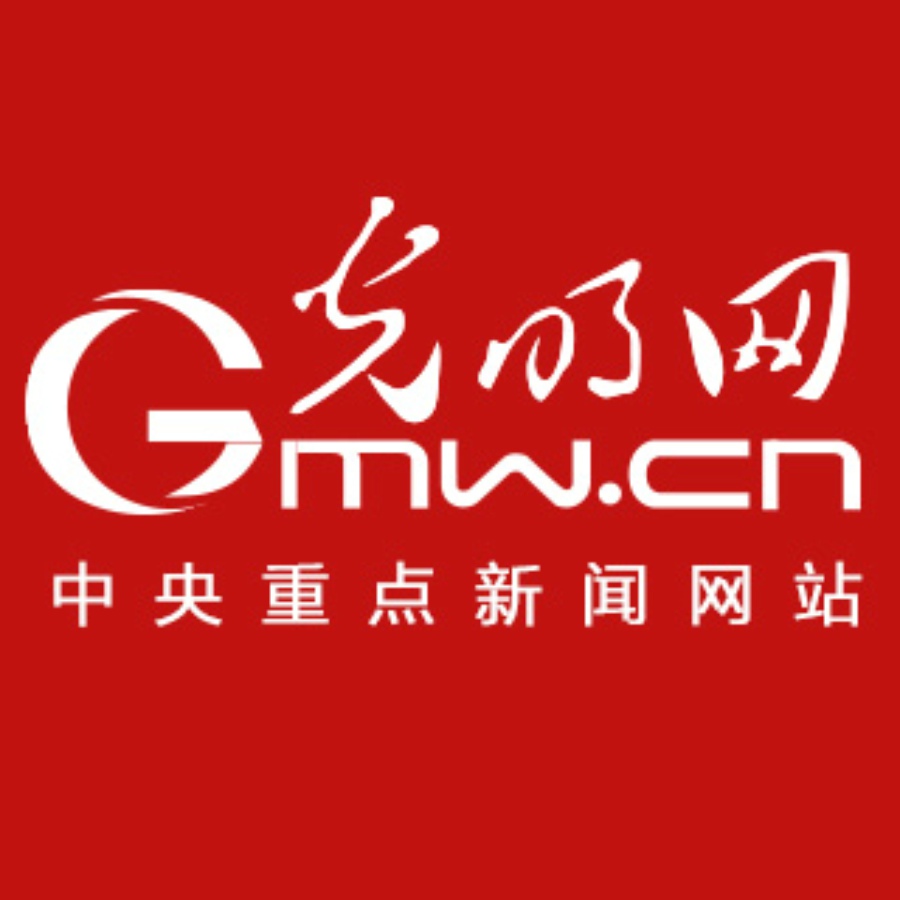
点击右上角![]() 微信好友
微信好友
 朋友圈
朋友圈

请使用浏览器分享功能进行分享

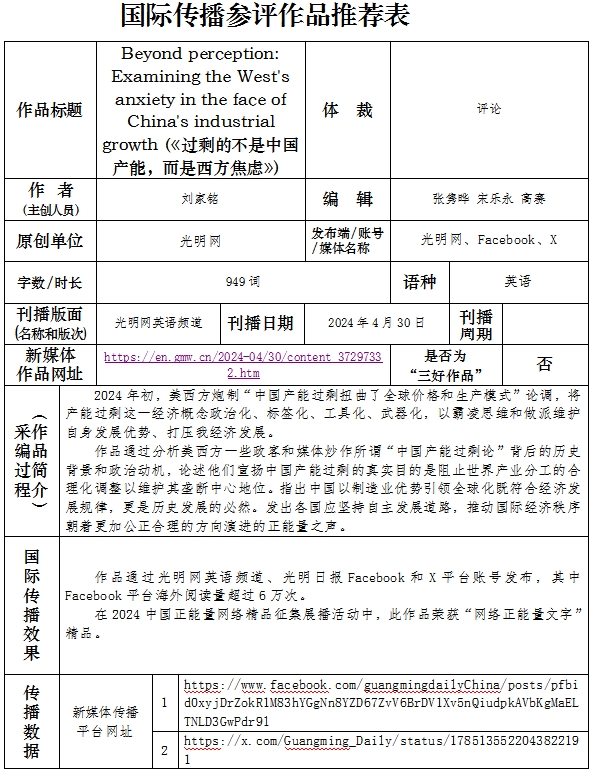
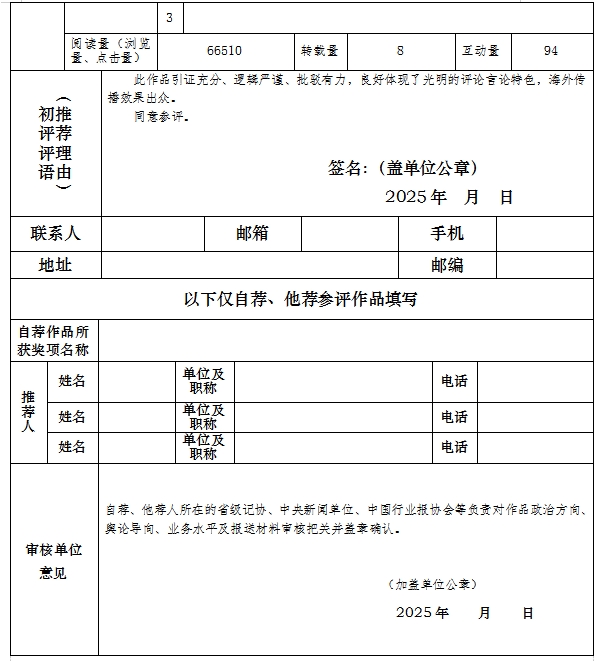
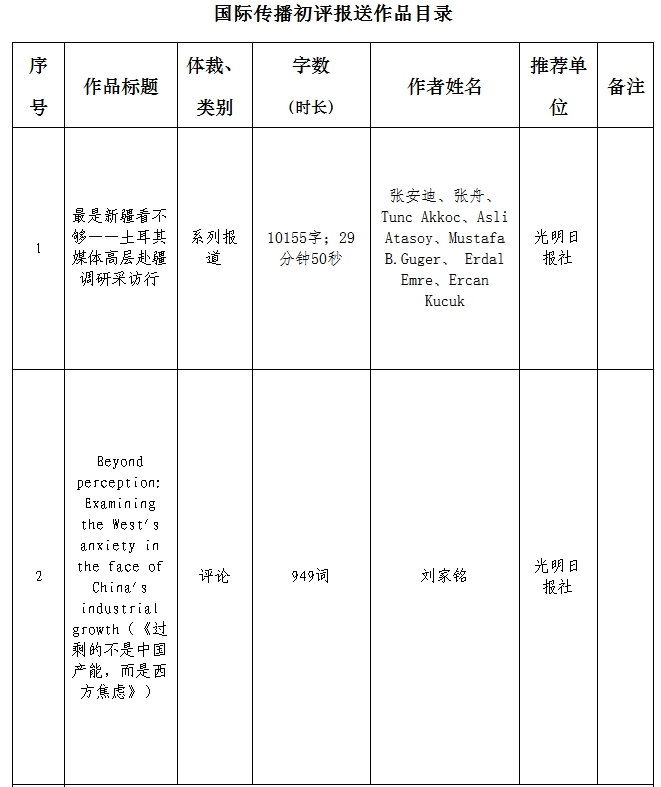
译文
Beyond perception: Examining the West’s anxiety in the face of China’s industrial growth
过剩的不是中国产能,而是西方焦虑
2024-April-30 10:25 By: GMW.cn
2024年4月30日10:25来源:光明网
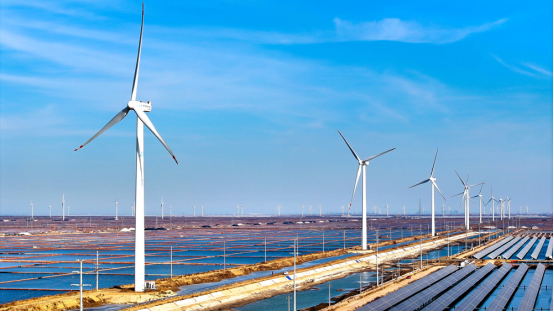
Aerial photo taken on Jan. 26, 2024 shows the Hengyuan Photovoltaic (PV) Project in Yingli Town, Shouguang City of east China's Shandong Province. (Xinhua/Guo Xulei)
位于中国东部山东省寿光市营里镇的恒源光伏项目(新华社记者郭绪雷摄于2024年1月26日)
By Light Blade
作者:光刃
Recent pronouncements by some Western politicians and media outlets regarding China’s so-called “excess capacity” reflect growing anxieties, not objective economic analysis. These claims distort China’s hard-earned comparative advantages via accusations of “unfair competition” by painting China’s high-quality, globally beneficial production capacity as a threat to the world economy. This narrative is a thinly veiled attempt to discredit China’s economic rise. It represents a new “cognitive warfare” being waged against China’s economic model. China, however, remains confident in its development path. Speculation and unfounded accusations will not deter China from pursuing its industrial transformation and modernization through high-level opening-up and high-quality development.
近期,部分西方政客和媒体炒作的所谓“中国产能过剩论”,并非什么客观经济分析,更多反映的是西方日益加剧的焦虑。这些言论通过指责中国“不公平竞争”,将中国来之不易的比较优势歪曲为全球经济的威胁。这种叙事,本质上是对中国经济崛起的抹黑,是一场针对中国经济模式的新型“认知战”。然而,中国对自身发展道路充满信心,外界的揣测与无端指责无法阻挡中国通过高水平开放和高质量发展推进工业转型和现代化的步伐。
The West’s recent rhetoric surrounding “China’s overcapacity” reveals a complex interplay of anxieties and the evolving global order. The rise of developing nations and their integration into the process of economic globalization challenges the centuries-old “center-periphery” model of industrial division of labor. This model, once solidified by Western dominance in science, technology, finance, and military power, now faces disruption as developing countries emerge as new hubs of manufacturing, innovation, and development. The West’s anxieties stem from a confluence of factors. The global financial capital has hollowed out the real economy in developed nations by weakening their manufacturing. Consequently, the narrative of “China’s overcapacity” serves as a tool to suppress technological and industrial progress in developing countries, effectively maintaining the Western grip on the global supply chain. This is not a battle over capacity, but a clash between the entrenched interests of the established order and the developing world’s struggle for a more equitable system. In essence, the “overcapacity” claim is a false narrative masking the West’s “overcapacity in anxiety.” It’s time for a paradigm shift that recognizes the evolving strengths of developing nations and fosters a more balanced global economic landscape.
西方近期围绕“中国产能过剩”的论调,实质上折射出其在全球秩序变迁中的复杂焦虑。发展中国家的崛起及其深度融入经济全球化,正在打破西方长期主导的“中心–外围”工业分工模式。因西方在科技、金融与军事领域的优势,该模式曾长期处于稳固态势,但随着发展中国家逐步成为制造业、创新和发展的新枢纽,西方的主导地位正受到严重冲击。西方的焦虑来源于多重因素:全球金融资本的膨胀削弱了发达国家的实体经济,导致制造业空心化。因此,“中国产能过剩”的论调被用作打压发展中国家科技与工业进步的工具,旨在维护西方在全球供应链中的主导地位。这场较量的核心,不在于产能本身,而是既有秩序的既得利益集团与发展中国家争取更公平经济体系之间的博弈。所谓“过剩产能”的论调,实则是西方“过分焦虑”的体现。发展中国家实力的崛起,正呼唤全球经济格局的范式转变。
Economic globalization and market-driven division of labor have fueled the prosperity of the planet. Traditionally, natural resources dictated comparative advantages between countries. However, the spread of technology at a global scale and stronger strategies in certain developing countries are changing the equation. New factors like industrial policy, strategic planning, and innovation are playing a more significant role. By cultivating these advantages and strategically integrating resources, nations can elevate their industrial and value chains for global competition. This fosters a more efficient global division of labor, optimizing resource allocation and boosting market mechanisms. Ultimately, it leads to a more efficient global production system and a potential rise in overall human well-being. However, history shows that economic laws can be disrupted by political intervention that potentially hinders a smooth transition towards a more efficient global system.
经济全球化与市场驱动的分工促进了世界的繁荣。传统上,各国的比较优势主要依赖于自然资源。然而,随着技术的全球化扩散以及部分发展中国家战略能力的提升,这一格局正在被重新定义。工业政策、战略规划与创新等新兴因素,正发挥越来越重要的作用。通过培育壮大优势和战略性整合资源,国家可以有效提升其在全球竞争中产业链与价值链的地位。这不仅有助于推动更高效的全球分工与资源配置,还能提升市场机制的效率,进而促进全人类的共同福祉。然而,历史经验表明,政治干预可能会扰乱经济秩序,从而阻碍全球体系向更高效方向的平稳过渡。

An exhibitor arranges lithium battery exhibits during the 135th session of the China Import and Export Fair in Guangzhou, south China's Guangdong Province, April 15, 2024. (Xinhua/Liu Dawei)
第135届中国进出口商品交易会上,一名参展商在布置锂电池展品。(新华社记者刘大伟摄于2024年4月15日,中国·广州市)
Britain’s once-unmatched industrial dominance was a relic of the past. As new players emerge, the old industrial leadership often resorts to desperate measures. The UK’s frantic attempts to maintain its role as global industrial center with political and military muscles serve as a stark example. Similarly, the post-WWII era saw the US wield its military, political, and financial might to curb the industrial resurgence of Europe and Japan, clinging to its position in the global division of labor. Today, China is capitalizing on its institutional advantages, strategic planning, and a robust capacity for learning and innovation. This has enabled the country to accumulate a competitive edge that challenges the US-led monopoly in various industries. While China’s focus on industrial advancement undoubtedly benefits global prosperity, it threatens established monopolies. The US responded with protectionism and veiled containment tactics in an attempt to derail China’s industrial ascent. The notion of “overcapacity” is not a market-driven conclusion, but a crafted narrative mirroring the desperate attempt to retain a bygone era of dominance.
如今,英国昔日无可匹敌的工业霸主地位早已成为历史。当新兴国家崛起时,传统的工业强国往往会采取极端手段以维持其地位。例如,当工业中心地位遭受威胁时,英国曾试图通过政治和军事手段维持其全球工业中心的角色。同样,二战后,美国依靠其军事、政治和金融力量竭力遏制欧洲与日本的工业复兴,以巩固其自身在全球分工中的主导地位。如今,中国凭借制度优势、战略规划以及强大的学习和创新能力,逐步积累起在多个领域挑战美国主导垄断的竞争力。中国对工业发展的重视无疑促进了全球繁荣,但也对现有的垄断格局构成了冲击。因此,美国采取保护主义和隐性遏制手段,试图阻挠中国的工业崛起。所谓“产能过剩”并非基于市场化的结论,而是在维护旧有主导地位的焦虑之下精心编造的叙事。
China’s ascendancy in the “three new sectors” – electric vehicles, lithium-ion batteries, and solar cells – offers high-quality products, boosts global economic growth, and promotes price stability. This competitive edge, driven by strategic planning aligned with economic laws, exemplifies developing nations leveraging market forces to leapfrog on industrial chains and reshape the global division of labor. However, anxieties over maintaining dominance have led the United States and the West to curb China’s progress through “decoupling” and “breaking up the global supply chain”, which stands in the way of reasonable restructuring of the global supply chain. It exposes the inherent politicization beneath what seems to be pure economic moves. Unequal economic standings of countries are the result of some countries wielding military, political, financial, and cultural power to manipulate and distort free market adjustments. These actions aim at solidifying, and even perpetuating, an unequal “center-periphery” structure of the global economy.
中国的“新三样”——电动汽车、锂离子电池与太阳能电池的崛起,不仅为全球经济增长提供了高质量产品,还推动了价格稳定。这一竞争优势源于中国遵循经济规律的战略规划,展示了发展中国家如何通过市场力量实现产业链跃升并重塑全球分工。然而,出于对主导地位丧失的担忧,美国和西方国家通过“脱钩断链”等手段遏制中国的发展,阻碍全球供应链的合理重组。这暴露了所谓经济举措背后的高度政治化。不平等的全球经济格局,是个别国家利用军事、政治、金融与文化力量干预市场调整的结果,其目的在于固化并延续全球经济“中心–外围”的不平等结构。
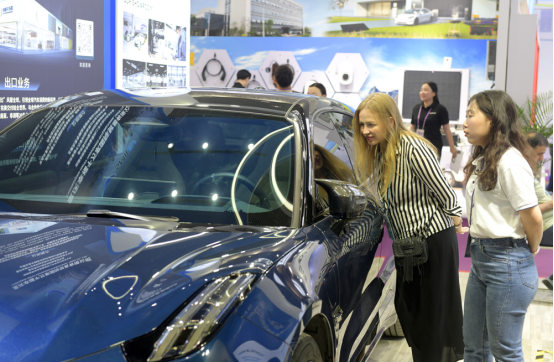
A purchaser learns about a new energy vehicle during the 135th session of the China Import and Export Fair in Guangzhou, south China's Guangdong Province, April 15, 2024. (Xinhua/Lu Hanxin)
在第135届中国进出口商品交易会上,一名采购商正在了解新能源车。(新华社记者卢汉欣摄于2024年4月15日)
Over the past few hundred years, the West has led the process of industrialization and globalization, and at the same time cultivated an implicit perception that the Western-dominated global industrial division of labor and international economic order will remain unchanged. However, China’s surging manufacturing strength is disrupting this long-held perception. Its rise to a leading role in global manufacturing is not only inevitable from an economic perspective, but also a historical trend unfolding in front of our eyes. This “breakthrough” shatters the illusion of Western supremacy, paving the way for a more balanced and less monopolized world economy. In this sense, it makes a compelling case for developing nations seeking self-reliance and charting their own paths to prosperity.
在过去的几百年里,西方主导了工业化与全球化进程,同时也形成了一种隐性的错觉,即认为西方主导的全球工业分工与国际经济秩序是一成不变的。然而,中国制造业的强势崛起正不断打破这一旧有认知。从经济视角来看,中国成为全球制造业的领军者是大势所趋;从历史视角来看,这也是必然的发展趋势。这一“突破”打破了西方长期以来的优越幻象,为构建更加均衡、更少垄断的全球经济新格局奠定了基础。从这个意义上讲,它也为发展中国家提供了追求自力更生与自主发展的宝贵经验和启示。
Editor:Zhang Junye, Song Leyong,Gao Sai
编辑:张隽晔,宋乐永,高赛
落地证明截图
